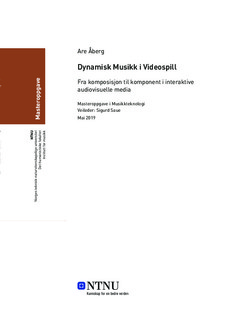Dynamisk musikk i videospill
Master thesis
Permanent lenke
http://hdl.handle.net/11250/2617839Utgivelsesdato
2019Metadata
Vis full innførselSamlinger
- Institutt for musikk [497]
Sammendrag
Videospill er et medium som gir en opplevelse som stimulerer flere sanser. Spillmusikk er en vital del av videospill som forsterker formidlingen og aksepten av en fiktiv verden. Gjennom eksisterende teori og praktisk arbeid belyser denne masteroppgaven hvordan musikken går fra å være en frittstående komposisjon til det oppgaven refererer til som dynamisk musikk. Rapporten tar utgangspunkt i relevant litteratur, samt intervjuer med to lyddesignere og én komponist som jobber i spillbransjen. Dette utgjør perspektiver på hvilke teknologiske og estetiske faktorer som definerer spillmusikk, hvordan disse utgjør musikkens funksjon i et videospill, og hvilke verktøy som kan realisere disse funksjonene.
Oppgavens praktiske del har bestått av konseptutvikling av et imaginært spill med implementert egenkomponert spillmusikk. Arbeidet gir et innsyn i hva skillet mellom musikken som en komposisjon og dynamisk musikk er, samt en demonstrering av et utvalg av funksjonene og verktøyene presentert i rapporten. Fokuset i arbeidet har vært å la musikken opptre på sine egne betingelser når komposisjonene går fra å være en frittstående komposisjon til dynamisk musikk. Samtlige ledd i prosessen har forholdt seg til konsepter fra perspektivene fra oppgavens rapport. Video games provides an experience that stimulates multiple senses. Game music is a vital part of video games by reinforcing the dissemination and acceptance of a fictional world. Through existing theory and a practical approach, this thesis illuminates how music changes from being a stand-alone composition to what this thesis refers to as dynamic music. The report is based on relevant literature and interviews with two sound designers and one composer from the gaming industry. This constitutes perspectives on technological and aesthetic factors that define game music, how they accumulate towards the functional aspects of game music, and which tools that can embody these functions.
The practical approach of this thesis consists of concept development of an imaginary game with implemented self-composed game music. The work illuminates what the distinction between music as a composition and dynamic music is, as well as demonstrating a selection of musical functions and tools presented in the report. The work focuses on letting the music perform on its own conditions during the transition from being a stand-alone composition to dynamic music. Every aspect of the process is related to concepts presented in the report.
